The China and the World Global Lecture Series has become the school‘s signature public event. It features high-profile and distinguished scholars from around the world, and topics cover computational and AI communication, global media and communication, digital humanities, integrated media studies, urban communication, media technology philosophy, health communication and more. Speakers at the forefront of academic research conduct two to four lectures, each followed by a Q&A session. In 2023, the China and the World Global Lecture Series held 7 sessions with 11 lectures and featured 8 speakers from 7 universities in 6 countries. The following is a brief review of the 7 sessions.
1. Session 10: Ethics in the Development and Application of Youth Intelligent Nursing Infrastructure

By Prof. Christine Hine, from the Department of Sociology, University of Surrey, UK
Professor Hain focused on the relationship between intelligent nursing technology and ethical principles based on cutting-edge research, that has made important contributions to the development of this field. This lecture focuses on the influence of the development and application of intelligent nursing technology on the privacy and rights of young people. Intelligent nursing technology is expected to improve the quality of life and health of young people, but there are also some potential moral problems, such as privacy protection, equal rights, and data security. As intelligent nursing technology develops, we must pay attention to the influence of these technologies on the privacy and rights of young people, and take corresponding moral measures to ensure the rationality and moral use of intelligent nursing technology.
2. Session 11: Why is fan culture very important?
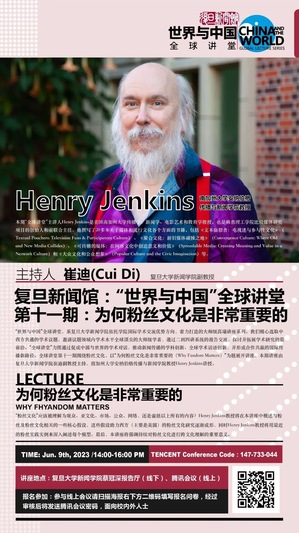
By Prof. Henry Jenkins, from the School of Journalism, Film Art and Education, University of Southern California, USA, founder and former co-director of the Comparative Media Research Program at MIT.
Should fan culture be understood as the audience, subculture, market, public, network, or all of the above? In this lecture, Professor Jenkins outlined some core assumptions related to fans and fan culture, which has advanced the study of fan culture in the West (mainly the United States). At the same time, he elaborated on each model with recent examples of fan practice and emphasis on the importance of cross-cultural understanding of fan culture.
3. Session 12: Artificial Intelligence
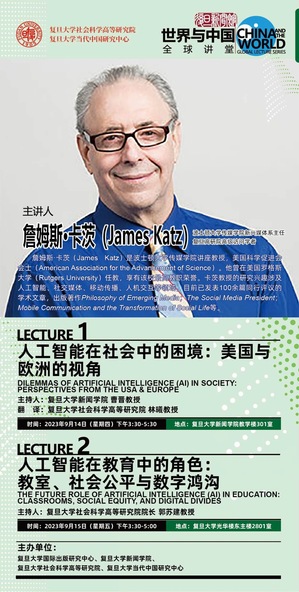
By Prof. James Katz, Dean of the School of Communication, Boston University, and Fellow of the American Association for the Advancement of Science.
Lecture 1: Dilemmas of artificial intelligence in society: from the perspective of the United States and Europe;
Lecture 2: The Future role of artificial intelligence in education: classroom, social justice, and digital divide
This lecture focused on the theme of artificial intelligence. In the first lecture, Professor Katz analyzed the structure of new media technology on daily life from a historical and modern perspective and discussed the subsequent conflicts affecting AI development policy. He paid special attention to the influence of Chat GPT and other large language models on personal career and employment opportunities. In addition, he analyzed the pros and cons of regulating AI, and in this context, extended his consideration of the future of mankind. The iterative upgrading of new media technology urgently calls on researchers to reflect on its all-round and deep-seated influence on the relationship and quality of education. In the second lecture, Professor Katz did an in-depth analysis on difficulties and countermeasures in the field of education in the era of artificial intelligence, based on taking care of structural propositions such as data gaps.
4. Session 13: Global advertising self-regulation and supervision and government intervention in subsidizing media
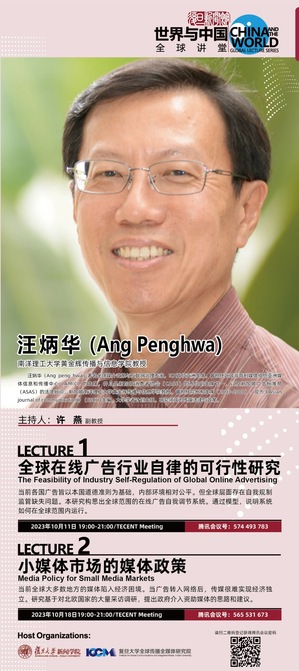
By Ang Penghwa, from Huang Jinhui School of Communication and Information, Nanyang Technological University, editor-in-chief of the Asian Journal of Communication (SSCI), and director of the university scholar program.
Lecture 1: The feasibility of industry self-regulation in global online advertising.
Lecture 2: Media policy for the small media market.
Professor Wang Binghua conceived a global online advertising self-regulation system to prove that the whole industry (not individual companies) can self-regulate advertising. Theoretically, the conditions for successful self-regulation exist. In the first lecture, Professor Wang Binghua showed the theory and conditions for establishing a feasible framework for global operation, and answered the question: Why should we supervise? Why do people want to supervise themselves? How to establish an excellent self-regulatory mechanism? Wait for questions. As advertising increasingly turns to online platforms, media in most parts of the world are facing economic difficulties. In the second lecture, Professor Wang Binghua suggested that the government must step in and provide financial assistance to the news media. He detailed a number of interviews and investigations in Nordic countries, and put forward ideas and suggestions for the government to intervene in subsidizing the media.
5. Session 14: Communication Complexity and Public Diplomacy

By Prof. Thomas Gerald Goodnight, from USC Annenberg School for Communication and Journalism, an outstanding scholar of the National Communication Association in the US.
Lecture 1: Oceans of communication, tides of change, navigating complexity.
Lecture 2: Strategic Communication and Public Diplomacy
In the first lecture, Professor Goodnight tried to answer the question: How can we thrive in the complex natural process of communication and systematic intervention provided by search engines, social media, and artificial intelligence. How to review the art of negotiation and healthy competition among creatures, people, groups, and countries. In the second lecture, from the perspective of strategic communication and public diplomacy, he introduced Books for Development in Uganda and the Fulbright program in Chile, and also discussed international food safety, polar governance, and international structure.
6. Session 15: New Technological Change and Future University Education
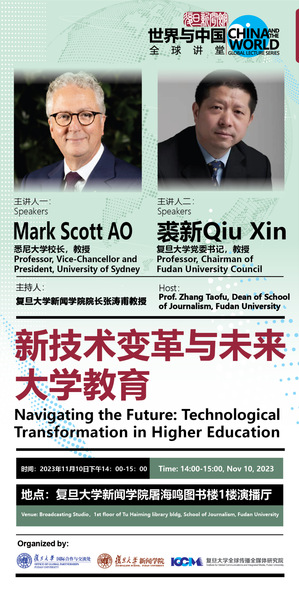
By Professor Mark Scott, 27th President of the University of Sydney and Secretary of the New South Wales Department of Education; Qiu Xin, Party Secretary and Professor of Fudan University
In this lecture, Professor Scott and Secretary Qiu Xin had an in-depth dialogue on the theme of new technological changes and future university education. The two lecturers are leaders at top universities, and are also first-class media experts and scholars. They have rich working experience in the media industry. They held an in-depth discussion on the influence of new technologies on university education and the media industry and explored the direction of future development.
7. Session 16: Social Media and Urban Communication
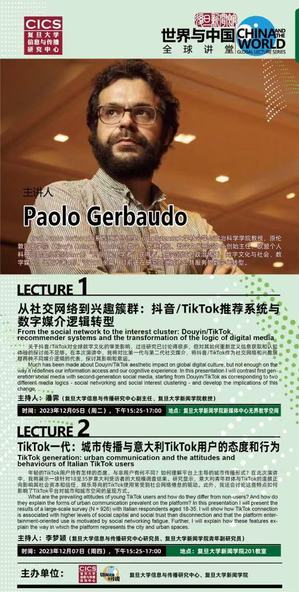
By Prof. Paolo Gerbaudo, Marie Curie scholar, from the School of Sociology and Political Science, Complutense University of Madrid (UCM)
Lecture 1: From Social Network to Interest Cluster: TikTok Recommendation System and Logical Transformation of Digital Media
Lecture 2: TikTok generation: urban communication and the attitude and behavior of TikTok users in Italy
This lecture focused on the theme of Social Media and Urban Communication. In the first lecture, Professor Gerbaudo compared the first and second generations of social media and took TikTok as the representative of two different media logics, social networks, and interest clusters, and discussed its influence and meaning. In the second lecture, Professor Gerbaudo showed the results of a large-scale survey of Italian respondents aged 18 to 35. The study showed that the connection between Italian youth groups and TikTok positively affected their social capital and trust, and use of the entertainment-oriented TikTok was often driven by social network burnout. In addition, he also discussed how these characteristics affect the presentation of cities and urban spaces on the TikTok platform.

